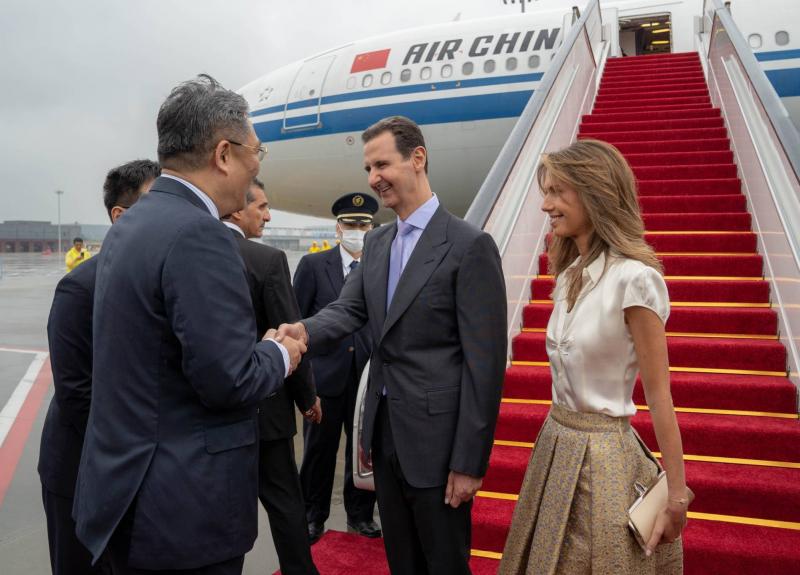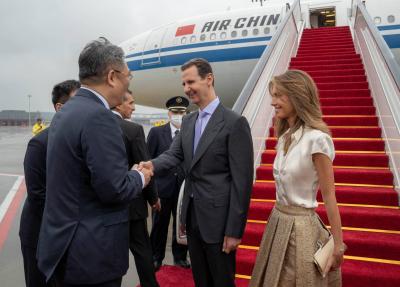Chinese state media reported today, Thursday, that Syrian President Bashar al-Assad arrived in Hangzhou, eastern China, marking his first visit since 2004. This move is seen as a step towards ending over a decade of diplomatic isolation due to Western sanctions. Assad arrived on an Air China flight amidst thick fog, with state TV noting that this added an air of mystery, indicating that the Syrian president has rarely been seen since the civil war that has claimed more than half a million lives began.
Assad is expected to attend the opening ceremony of the Asian Games alongside more than 12 foreign dignitaries, after which he will lead a high-level delegation in a series of meetings across several Chinese cities, including a summit with Chinese President Xi Jinping.
A source from the Syrian delegation indicated that Assad will meet with Xi tomorrow, Friday, one day before attending the games' opening. Additional meetings for the Syrian delegation are set to take place in Beijing on Sunday and Monday. Assad's appearance alongside the Chinese president at a regional gathering could further legitimize his country's effort to gradually return to the global arena. Syria joined China's Belt and Road Initiative in 2022 and returned to the Arab League, consisting of 22 countries, in May.
Assad last visited China in 2004 to meet then-President Hu Jintao, marking the first visit by a Syrian president to China since the establishment of diplomatic relations in 1956. China, like Syria's main allies Russia and Iran, has maintained these relations even as other countries isolated Assad due to his government's crackdown on anti-government protests that began in 2011.
The United States, Europe, Australia, Canada, and Switzerland have imposed sanctions on Assad, but efforts to enforce multilateral sanctions against his regime have failed to gain unanimous support in the United Nations Security Council, which includes China and Russia. China has vetoed at least eight United Nations resolutions condemning Assad's government and aimed at ending the decade-long multifaceted conflict, which has attracted both neighboring countries and global powers.
Unlike Iran and Russia, China has not directly supported the regime's efforts to regain control over the country. UN-appointed investigators have stated that Russian bombardments and Iranian-backed militias are responsible for the majority of the more than 200,000 civilian deaths recorded since the war began, leading to refugee crises and drug trafficking issues that the Arab League has pressured Damascus to resolve.
Syria holds strategic importance for China as it is situated between Iraq, which supplies about ten percent of China's oil, Turkey, the endpoint of extended economic corridors from Asia to Europe, and Jordan, which often mediates regional disputes. Assad's visit to China, which will last for several days, is one of the longest periods he has been away from Syria since the onset of the civil war.
Chinese government-owned energy companies, including Sinopec, Sinochem, and the China National Petroleum Corporation, invested a total of three billion dollars in Syria between 2008 and 2009 in an effort to acquire oil and gas assets worldwide. Investments included Sinopec's acquisition of small Tengiz Oil for two billion dollars and Sinochem's purchase of Emerald Energy in London, whose assets are mainly located in Syria and Colombia, for around 900 million dollars.
Sinochem ceased its operations in Syria in 2011, while officials from the China National Petroleum Corporation stated that the company, involved in oil production in several small regions, stopped production in about 2014 after the European Union imposed sanctions and the United States deployed forces to fight ISIS.
Analysts are skeptical that Chinese companies are considering returning to Syria due to security concerns and the country's deteriorating financial situation. Samuel Ramani, an analyst at the RUSI think tank in London, said, "Syria has long been trying to attract investments from China, but the more pressing question is whether any proposals discussed during this visit will turn into actual projects." He added, "Currently, China is very frustrated with the West, and Syria is seeking to bolster its ties with other countries, but can that be transformed into something tangible?"




